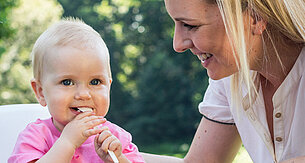A baby’s digestion: What should be done if stool is watery/soft?

An infants’s stool can vary strongly in colour, smell and consistency, depending on what the baby has been fed (breast milk, conventional milk formula, HA formula, weaning food) – just like adults.
The standard breast milk stool is soft to watery. If a child is exclusively bottle-fed, then depending on the composition of the formula, the stool can be harder or similar to breast-fed infants’ stool.
Bowel movement changes … can become more watery if…
- formula is changed (changeover phase)
- a child is teething
- little/less weaning food is eaten
- a child drinks a lot of additional fluids, e.g., in hot weather
- large amount of fruit/juice is consumed
What can you do?
Accept the situation and wait, change nappies more frequently, allow fresh air on the bottom and, if necessary, apply cream to protect the sensitive skin in the nappy region.
To make the stool firmer, the following tips can help (weaning food age)

- Be selective to the foods given to your baby
- Bananas and carrots are examples of foods that can make stools firmer
- On our jars, just under the list of ingredients, you can find notes on stool effect (stool firming), e.g., HiPP Baby's First Banana, HiPP Baby Carrots with Potatoes
- Check how much fruit and juice is being consumed and restrict amounts if necesary
If the stool is watery and unpleasant smelling and bowel movement takes place several times a day (more often than usual), then it is diarrhoea and you should consult a paediatrician at the soonest. Diarrhoea should always be treated by a doctor. Only your paediatrician can determine the cause.
If your child is also vomiting, and is running a temperature, or seems in any way ill, then it is most likely gastrointestinal disorder, which occurs quite frequently in infancy and toddlerhood. It is imperative that a pardiatrician clarifies the situation.
If a child is suffering from diarrhoea and/or vomiting, large amounts of fluids and minerals (electrolytes) are lost in a short time. If these are not replaced, the child’s body can dehydrate rapidly.
The most important thing is to compensate for the loss in fluids and minerals. For this, doctors recommend “drinking solutions” (oral rehydration solutions or ORS). They are available at most drugstores.




